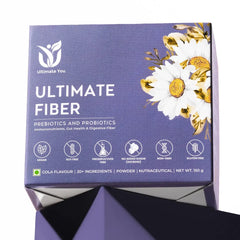Support your breastfeeding journey with top supplements for better milk production and energy.
Breastfeeding is a beautiful and rewarding experience, but it can create anxiety in women. In the early stages, many mothers face challenges such as low milk supply, fatigue, nutritional deficiencies, and the pressure of balancing self-care while caring for their newborn.
According to the World Health Organization (WHO), breastfeeding provides essential nutrients that contribute to an infant's immune system development, cognitive health, and overall growth. However, for mothers, breastfeeding requires additional energy, nutrients, and support to maintain their health and well-being during this critical time.
Many studies say that lactating mothers need up to 500 extra calories per day compared to their pre-pregnancy intake. Alongside, increased demands for vitamins and minerals such as calcium, iron, and DHA are essential for the mother's and the baby's health.
Unfortunately, meeting these nutritional needs through food alone can sometimes be difficult, especially given the fatigue and time constraints new mothers face.
This is where natural supplements come into play. By incorporating the right supplements into their daily routine, breastfeeding mothers can ensure they're getting the essential nutrients required for optimal milk production and overall health.
In this blog, we will guide you through the best natural supplements for lactating mothers. Read on to know more!
List of 10 Best Supplements For Lactating Mothers
Check out the top 10 supplements that can support your health for lactating mothers. From boosting milk production to enhancing overall energy, these supplements are essential for both mom and baby. Have a glimpse:
- Vitamin D3
- DHA (Docosahexaenoic Acid)
- Vitamin B12
- Folic Acid
- Calcium
- Iron
- Iodine
- Probiotics
- Choline
- Zinc
1. Vitamin D3
Vitamin D is essential for calcium absorption, immune function, and bone health in both lactating mothers and their babies. A study from PubMed Central suggests that breastfeeding mothers need around 6,400 IU of vitamin D daily to ensure their baby receives adequate vitamin D for healthy growth, particularly in bone development and immune support (1).
2. DHA (Docosahexanoic Acid)
DHA, an omega-3 fatty acid found in fatty fish, is essential for a baby’s brain and eye development. Since the body does not produce DHA naturally, breastfeeding mothers must obtain it through diet or supplements.
Consuming 1-2 portions of sea fish per week provides the recommended 200 mg of DHA daily, as per the recent studies from NCBI (2). For mothers who do not eat fish, algae-based DHA supplements are a reliable alternative.
DHA supports cognitive function, brain structure, and vision development in infants while also benefiting mothers by reducing the risk of postpartum depression. Prioritizing DHA intake helps ensure optimal health for both mother and baby during lactation.
3. Vitamin B12
Vitamin B12 is essential for an infant's brain development and the production of healthy red blood cells (3). It is particularly important for breastfeeding mothers who follow a vegetarian or vegan diet, as B12 is found predominantly in animal products.
If a breastfeeding mother does not consume enough B12, her baby could develop a deficiency, which may affect growth and development.
Many studies reveal that lactating mothers need 2.6 mcg of Vitamin B12 daily. This amount ensures that an exclusively breastfed baby gets 0.016 mcg/kg of Vitamin B12 daily through breast milk (4).
However, if taking a supplement, higher doses may be needed. Organic Vitamin B12 supplements are a great option to meet the increased demands.
4. Folic Acid
Folic acid helps support the production of healthy red blood cells and promotes the baby’s growth. While breastfeeding, the body’s need for folic acid increases, and ensuring sufficient intake can help prevent deficiencies.
Foods like leafy greens, beans, and fortified cereals are great sources, but supplements may also be recommended. This proactive approach empowers you to help safeguard both maternal and infant health during this critical time.
5. Calcium
Nursing moms may lose 3-5% of their bone mass to meet their baby’s calcium needs, which can affect bone health. To replenish calcium stores and support overall bone health, it's crucial to ensure adequate calcium intake.
The recommended daily dose of calcium intake for breastfeeding mothers is 1,000 mg (5). You can get calcium from dairy products, leafy greens, fortified plant-based milks, and supplements. Pairing calcium with vitamin D and K2 enhances absorption, while avoiding antacids helps prevent interference with calcium intake.
6. Iron
Iron is another crucial nutrient for lactating mothers. During breastfeeding, iron is used in milk production, and a deficiency can lead to anemia, which may cause fatigue, weakness, and cognitive impairment. Iron supplements are particularly important for mothers who experienced significant blood loss during childbirth or those with low iron levels before pregnancy.
The recommended daily dose of iron for breastfeeding mothers is 23 mg as per the latest clinical reports. To meet the daily iron needs, mothers should also include iron-rich foods like leafy greens, legumes, lean meats, and fortified cereals in their diet. This combination helps ensure the health and vitality of both the mother and baby during breastfeeding.
7. Iodine
Iodine is crucial for producing thyroid hormones, which regulate metabolism and support brain development in babies. For breastfeeding mothers, adequate iodine intake is vital for the healthy development of the baby’s brain and nervous system. A deficiency in iodine leads to thyroid issues for both the mother and the baby.
Breastfeeding mothers should consume 290 mcg of iodine daily during the first year postpartum, as recommended by the Dietary Guidelines of CDC (Centers for Disease Control and Prevention) (6). Natural sources of iodine include seaweed, dairy products, and iodized salt. However, iodine supplements may be necessary for those with low iodine levels.
8. Probiotics
Probiotics are beneficial bacteria that support gut health and immune function in breastfeeding mothers. They can improve digestion, boost immunity, and may reduce the risk of postpartum depression. Studies suggest maternal probiotics may also help protect babies from eczema and allergies.
To add on, probiotic supplements come in various strains, so it’s important to consult a gynecologist to determine the right strain and dosage for breastfeeding mothers.
9. Choline
Choline is an essential nutrient that plays a vital role in supporting brain and liver function in postpartum mothers. Adequate choline intake also helps maintain healthy cholesterol levels, which is important for overall cardiovascular health during the postnatal period.
Foods like eggs, liver, and soy are excellent sources of choline, which is essential for both mother and baby. However, to meet the increased demand during lactation, supplements may be necessary. So, one should aim for a daily choline intake of 550 mg, be it through supplementation or food sources (7).
10. Zinc
Did you know that zinc plays a vital role in your health during breastfeeding? This essential mineral supports immune function, promotes wound healing, and aids in cell growth. Zinc also helps with milk production, ensuring your baby gets the nutrients they need.
Ensuring adequate zinc intake helps prevent deficiencies that can cause fatigue and weaken immunity. For optimal health, include zinc-rich foods such as meat, nuts, and seeds in your diet. Lactating mothers should aim for a daily dose of 14.1 mg of zinc (8).
Bottom Line
In conclusion, while supplements can be helpful for lactating mothers, they should complement, not replace, a balanced diet. The best approach is to combine healthy foods with the right supplements to ensure both the mother and baby are getting the nutrients they need. Before starting any new supplements, breastfeeding mothers need to consult their healthcare provider for advice on safety and effectiveness.
A survey by the American Pregnancy Association (APA) found that nearly 75% of mothers experience some form of difficulty with breastfeeding, such as insufficient milk supply or discomfort.
With the right support and the proper supplements, mothers can overcome these challenges and feel confident in providing the best for themselves and their babies.
Disclaimer
The information provided is for educational purposes only and is not intended to be a substitute for medical treatment. If you're pregnant, nursing, taking medication, or have a medical condition, it's better to consult a healthcare professional. Ultimate You does not provide any guarantee regarding the accuracy, adequacy, completeness, legality, reliability, or usefulness of the information and disclaims any liability arising from it.

Ram Charan
Content Lead
With over 7 years of experience, he crafts engaging stories and compelling narratives. He believes crisp and engaging content adds value to customers and drives immense sales to businesses. When he's not working, you'll find him hanging out with friends, binge-watching movies, and exploring the world of organic foods.
Tags
Frequently Asked Questions
How do supplements help lactating mothers?
Supplements support nursing moms by enhancing milk production, improving nutrient content, and boosting overall breast health.
Which natural supplements are best for lactating mothers?
Fenugreek, flaxseed, calcium, vitamin D, and omega-3 fatty acids are excellent natural supplements to support lactating mothers.
Are there any side effects of taking supplements while breastfeeding?
Some supplements may cause nausea, vomiting, headaches, digestive issues, or allergic reactions. Always consult a healthcare provider before use while breastfeeding.
How do natural supplements benefit my baby’s growth?
Natural supplements can offer essential nutrients, such as DHA, vitamins, and minerals, that support your baby’s development.
How long should breastfeeding moms take lactation supplements?
Breastfeeding mothers can take supplements throughout breastfeeding or until babies start solids, typically around six months.
- Choosing a selection results in a full page refresh.
- Opens in a new window.
15%

on your next order
By submitting your email address, you agree to receive marketing emails from Ultimate You at the email address provided. We may use information collected about you on our site to suggest the products and offers. you can withdraw your consent at any time by following the unsubscribe instructions in any email we send to you. view Terms and Privacy. Contact Ultimate Customer Care at #204-8430 Saint Monica Building, near Char Miner, Hyderabad, India, 203455.






